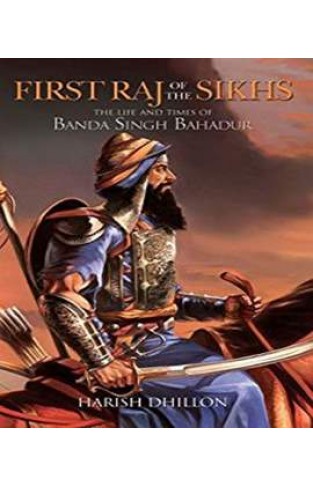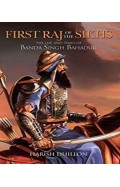First Raj of the Sikhs
By: Harish Dhillon
-
Rs 976.50
- Rs 1,395.00
- 30%
You save Rs 418.50.
Due to constant currency fluctuation, prices are subject to change with or without notice.
Banda Singh Bahadur appeared in Sikh history for a relatively short period (1708-1716) but, after the Sikh gurus, influenced it more significantly than any other individual
Banda Singh Bahadur is among the most colourful and fascinating characters in Sikh history. From an ascetic he was transformed into Guru Gobind Singh’s most trusted disciple. So much so that when the seriously injured guru could not lead his Sikh army against the Mughal forces, he appointed Banda Singh Bahadur as his deputy. As proof of this appointment he gave Banda his sword, a mighty bow, arrows from his own quiver, his battle standard and his war drum.
Banda rode out from Nanded (where Guru Gobind Singh passed away; now in Maharashtra) at the head of a small band of Sikhs, which, by the time it reached the Punjab, had grown into a formidable army. Over the next few years his exploits against the Mughal rulers, both in pitched battles and in skirmishes, became the stuff of legends. He became the first of many legendary Sikh generals, famous both for their personal heroic courage and their skill in warfare. His many encounters with the Mughal rulers eroded the very foundation of the Mughal empire and ensured its quick demise. As he said when questioned on what he had achieved: ‘I have ensured that never again will the crown sit easily on the Mughal emperor’s head.’ He also prepared the coming generations of Sikhs for future conflicts, which later greatly helped Maharaja Ranjit Singh in creating a Sikh empire.
Banda was a true leader who led from the front, not only in the battlefield but also in civil administration. He established a secular government which swept aside 700 years of slavery and the myth of domination by foreign powers, proclaimed freedom of worship, allowed the people to follow professions of their choice and stopped forcible marriages even while recovering abducted women for return to their families. His land revolution abolished zamindari in parts of North India, thereby redistributing land equally amongst the tillers.
This book seeks to tell the story of this remarkable and brave man and his equally remarkable ahievements. Perhaps, the finest of Banda Singh Bahadur’s biographies.
| Book | |
| What's in the Box? | 1 x First Raj of the Sikhs |
Banda Singh Bahadur appeared in Sikh history for a relatively short period (1708-1716) but, after the Sikh gurus, influenced it more significantly than any other individual
Banda Singh Bahadur is among the most colourful and fascinating characters in Sikh history. From an ascetic he was transformed into Guru Gobind Singh’s most trusted disciple. So much so that when the seriously injured guru could not lead his Sikh army against the Mughal forces, he appointed Banda Singh Bahadur as his deputy. As proof of this appointment he gave Banda his sword, a mighty bow, arrows from his own quiver, his battle standard and his war drum.
Banda rode out from Nanded (where Guru Gobind Singh passed away; now in Maharashtra) at the head of a small band of Sikhs, which, by the time it reached the Punjab, had grown into a formidable army. Over the next few years his exploits against the Mughal rulers, both in pitched battles and in skirmishes, became the stuff of legends. He became the first of many legendary Sikh generals, famous both for their personal heroic courage and their skill in warfare. His many encounters with the Mughal rulers eroded the very foundation of the Mughal empire and ensured its quick demise. As he said when questioned on what he had achieved: ‘I have ensured that never again will the crown sit easily on the Mughal emperor’s head.’ He also prepared the coming generations of Sikhs for future conflicts, which later greatly helped Maharaja Ranjit Singh in creating a Sikh empire.
Banda was a true leader who led from the front, not only in the battlefield but also in civil administration. He established a secular government which swept aside 700 years of slavery and the myth of domination by foreign powers, proclaimed freedom of worship, allowed the people to follow professions of their choice and stopped forcible marriages even while recovering abducted women for return to their families. His land revolution abolished zamindari in parts of North India, thereby redistributing land equally amongst the tillers.
This book seeks to tell the story of this remarkable and brave man and his equally remarkable ahievements. Perhaps, the finest of Banda Singh Bahadur’s biographies.
Zubin Mehta: A Musical Journey (An Authorized Biography)
By: VOID - Bakhtiar K. Dadabhoy
Rs 630.00 Rs 1,050.00 Ex Tax :Rs 630.00
Anna Hazare: The Face Of Indias Fight Against Corruption
By: Pradeep Thakur
Rs 270.00 Rs 300.00 Ex Tax :Rs 270.00
The Origins of Political Order From Prehuman Times to the French RevolutioN
By: Francis Fukuyama
Rs 3,505.50 Rs 3,895.00 Ex Tax :Rs 3,505.50
Manning Up: How the Rise of Women Has Turned Men into Boys
By: Kay Hymowitz
Rs 796.00 Rs 995.00 Ex Tax :Rs 796.00
The Obama Syndrome: Surrender At Home War Abroad
By: Tariq Ali
Rs 1,165.50 Rs 1,295.00 Ex Tax :Rs 1,165.50
The Quest For Meaning: Developing A Philosophy Of Pluralism
By: Tariq Ramadan
Rs 1,255.50 Rs 1,395.00 Ex Tax :Rs 1,255.50
The Pakistan US Conundrum Jihadists The Military And The People The Struggle For Control
By: Yunas Samad
Rs 1,255.50 Rs 1,395.00 Ex Tax :Rs 1,255.50
An Enemy We Created: The Myth Of The Taliban Al Qaeda Merger In Afghanistan 19702010
By: Alex Strick van Linschoten
Rs 4,200.00 Rs 5,250.00 Ex Tax :Rs 4,200.00
WikiLeaks: Inside Julian Assanges War on Secrecy
By: David Leigh & Luke Harding
Rs 680.00 Rs 850.00 Ex Tax :Rs 680.00
Anna Hazare: The Face Of Indias Fight Against Corruption
By: Pradeep Thakur
Rs 270.00 Rs 300.00 Ex Tax :Rs 270.00
No recently viewed books available at the moment.
Zubin Mehta: A Musical Journey (An Authorized Biography)
By: VOID - Bakhtiar K. Dadabhoy
Rs 630.00 Rs 1,050.00 Ex Tax :Rs 630.00
Anna Hazare: The Face Of Indias Fight Against Corruption
By: Pradeep Thakur
Rs 270.00 Rs 300.00 Ex Tax :Rs 270.00














-120x187.jpg?q6)








-120x187.jpg?q6)



-120x187.jpg?q6)



